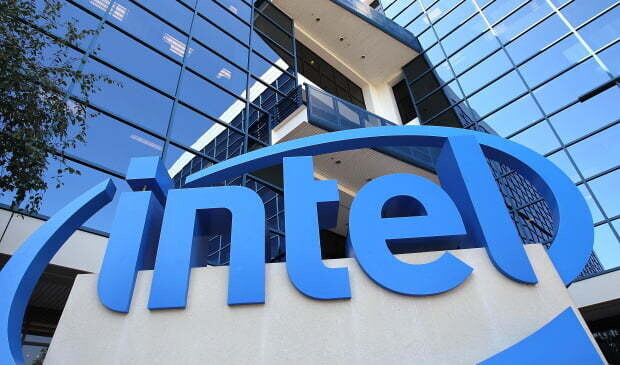hankyoreh
Links to other country sites 다른 나라 사이트 링크
Will Intel’s partnership with Arm give Samsung, TSMC a run for their money?

Intel’s venture into the foundry market with its new partner, the semiconductor chip designer firm Arm, is raising questions about possible repercussions for the second-largest foundry operator, Samsung Electronics.
Samsung, the world’s No. 1 memory chipmaker, has announced an ambitious plan to invest 300 trillion won over 20 years to build a semiconductor complex in Yongin, a city south of Seoul, so as to overtake Taiwan’s TSMC as the No. 1 foundry operator.
If Intel comes out on top of the foundry market, Samsung could find itself caught between TSMC and Intel.
Intel announced on Wednesday that Intel Foundry Services (IFS) and Arm will work together to produce low-power compute system-on-chips (SoCs) on the Intel 18A process.
The companies will initially focus on mobile SoC designs, but are expecting further design expansion into automotive, Internet of Things (IoT), data center, and aerospace and government applications.
Arm has the world’s largest mobile SoC design intellectual property and has collaborated with Apple and Qualcomm, among other companies. However, it has not previously worked with Intel, which pursued its own semiconductor designs.
“Intel’s collaboration with Arm will expand the market opportunity for IFS and open up new options and approaches for any fabless company that wants to access best-in-class CPU IP and the power of an open system foundry with leading-edge process technology,” tweeted Intel CEO Pat Gelsinger.
The collaboration represents Intel’s attempt to regain its former glory as a semiconductor powerhouse. Intel used to be the world’s No. 1 semiconductor company, boasting world-class capabilities from design to manufacturing, but over the past five years it has fallen behind in research and development, and its competitiveness has declined sharply.
To turn this around, Intel entered the foundry market in 2021, spurred on by the US government\'s support for the semiconductor industry. It launched Intel Foundry Services and amassed next-generation extreme ultraviolet (EUV) lithographers from ASML, the world’s top semiconductor equipment company, in the Netherlands, with plans to produce 2-nanometer products in 2024 and 1.8-nanometer products in 2025.
The plan is to enter the market with Arm, whose customers include Apple and Qualcomm.
Arm CEO Rene Haas highlighted the significance of collaboration between the two companies, noting that IFS could become “a critical foundry partner for our customers.”
If Intel and Arm’s collaboration proves to be a success, TSMC could continue to dominate the foundry market as Intel challenges Samsung Electronics for the No. 2 spot.
Just as Intel is developing a 1.8nm production process, TSMC and Samsung Electronics are reportedly developing a 2nm process with the goal of launching mass production in 2025.
“Intel Corp., trying to win customers as a provider of outsourced chip manufacturing, is working with Arm Ltd.,” Bloomberg reported. “By opening [its] factories to rivals, [Intel is] trying to claw back ground lost to Taiwan Semiconductor Manufacturing Co. and Samsung Electronics Co. — companies that surged ahead in manufacturing prowess.”
Experts in the Korean semiconductor industry are reluctant to jump to any conclusions about the knock-on effect of Intel and Arm’s collaboration.
“Intel says it has developed a nanotechnology manufacturing process, but we’ll have to wait and see whether they can boost yields to a level that enables actual mass production of the chips,” said a source in the semiconductor industry who spoke on condition of anonymity.
“Intel doesn’t currently have the capacity to produce [chips] at the 1.8nm level. Since production hasn’t actually begun yet, I don’t think this presents an immediate threat to TSMC or Samsung Electronics, given their solid position in the market,” said Kim Yang-paeng, a senior researcher at the Korea Institute for Industrial Economics & Trade.
By Ock Kee-won, staff reporter
Please direct questions or comments to [english@hani.co.kr]

Editorial・opinion
![[Editorial] Does Yoon think the Korean public is wrong? [Editorial] Does Yoon think the Korean public is wrong?](https://flexible.img.hani.co.kr/flexible/normal/500/300/imgdb/original/2024/0417/8517133419684774.jpg) [Editorial] Does Yoon think the Korean public is wrong?
[Editorial] Does Yoon think the Korean public is wrong?![[Editorial] As it bolsters its alliance with US, Japan must be accountable for past [Editorial] As it bolsters its alliance with US, Japan must be accountable for past](https://flexible.img.hani.co.kr/flexible/normal/500/300/imgdb/original/2024/0417/6817133413968321.jpg) [Editorial] As it bolsters its alliance with US, Japan must be accountable for past
[Editorial] As it bolsters its alliance with US, Japan must be accountable for past- [Guest essay] Amending the Constitution is Yoon’s key to leaving office in public’s good graces
- [Editorial] 10 years on, lessons of Sewol tragedy must never be forgotten
- [Column] A death blow to Korea’s prosecutor politics
- [Correspondent’s column] The US and the end of Japanese pacifism
- [Guest essay] How Korea turned its trainee doctors into monsters
- [Guest essay] As someone who helped forge Seoul-Moscow ties, their status today troubles me
- [Editorial] Koreans sent a loud and clear message to Yoon
- [Column] In Korea’s midterm elections, it’s time for accountability
Most viewed articles
- 1[Column] The clock is ticking for Korea’s first lady
- 2Samsung barricades office as unionized workers strike for better conditions
- 3[Editorial] When the choice is kids or career, Korea will never overcome birth rate woes
- 4S. Korea, Japan reaffirm commitment to strengthening trilateral ties with US
- 5[Editorial] As it bolsters its alliance with US, Japan must be accountable for past
- 6[Editorial] Does Yoon think the Korean public is wrong?
- 7Why Israel isn’t hitting Iran with immediate retaliation
- 8[Guest essay] How Korea turned its trainee doctors into monsters
- 9Japan officially says compensation of Korean forced laborers isn’t its responsibility
- 10[News analysis] After elections, prosecutorial reform will likely make legislative agenda